Deborah J. Ross's Blog, page 35
September 27, 2021
Auntie Deborah Answers Your Questions About Writing

In this installment, Auntie Deborah discusses writing a first draft, the unfairness of publishing, and when to run away from a publisher's contract.
Dear Auntie Deborah: How can I prevent myself from constantly trying to edit as I draft?
Auntie Deborah: You’re halfway there in understanding why it’s important to plough through that draft so you can look at the whole thing when it’s time to revise. It’s tempting but (for many of us) deadly to halt forward progress and nitpick. Here are a few strategies that have worked for me:
Beginning each session with reading the last page or so but not making any changes in it.Reminding myself that the only draft that counts is the one on my editor’s desk. And that what looks like an error may point me in the direction of a deeper, richer story, so I need to preserve all that drek the first time through.Reminding myself about author B, whose work I greatly admire, who told me that no one, not even her most trusted reader, sees anything before her third draft.Giving myself permission to be really, really awful.Falling in love with the revision process. I can hardly wait to get that first draft down so I have something to play with.Writing when I’m tired. Believe it or not, this helps because it’s all I can do then to keep putting down one word after another.All that said, sometimes editing is the right thing, like when it feels as if I’m pushing the story in a direction it doesn’t want to go, or I’ve written myself into a hole I can’t dig out of. Usually that means I’ve made a misstep earlier, not thought carefully about where I want to go. Or whatever I thought the story was about, I was wrong, and the true story keeps wanting to emerge. How do I tell when this is the case? Mostly experience, plus willingness to rip it all to shreds and start over.
Dear Auntie Deborah: How do you come up with names for your characters?
Auntie Deborah: Sometimes the novel and its setting dictate parameters for last names. For example, if I’m writing a science fiction novel about Scottish colonists on Mars, I’m going to look at Scottish last names.
Often the character herself will suggest a last name, either based in ethnicity or personal traits and history. An aging hippie might have changed their last name to Sunchild or Windflower or Yogananada. A family trying to erase immigrant origins might have a last name like Smith or Jones.
And then there’s the telephone book (do such things still exist?) Or the credits for a really big movie, the ones that go one for screen after screen after screen. Do be careful when using real last names, though. If they’re too different, they might be identifiable. Just use the lists as prompts for your thinking.
Another strategy is to look at first names and then use them as last names. (My middle name is Jean, which was my mother’s last name, so the reverse could also be true.)
That said, always do an internet search for the name you’ve chosen. Even if you aren’t aware of others with that name, it’s good to know.
Dear Auntie Deborah: Why do so many terribly-written books get published?
Auntie Deborah:
There are no quality gate-keepers (or, often editors and proofreaders) for self-published books. Anyone can type up garbage and throw it up on the web.Literary quality takes second (or twelfth) place to great story-telling, and great story-telling is in the mind of the reader. Commercial publishers go for what makes money, not what will be read and appreciated a century from now.As science fiction author Theodore Sturgeon said, “Ninety percent of everything is cr@p.” One might argue that 99.99 percent is more accurate.
It’s infuriating for authors who pour their heart and soul into a book to make it the very best they can. Alas, it’s also the cold, hard publishing business. But hang in there and keep improving, because someday, an editor will adore your work and shower you with money to buy the right to publish it.
Dear Auntie Deborah: Olympia Press offered me a hybrid contract, but I can't afford the fee. Am I walking away from a great opportunity?
Auntie Deborah: You are walking away not walking away from a great opportunity, you are walking away from a scam. Never pay a publisher! This is what Writer Beware, has to say:
Hybrid Publisher: There's some disagreement over whether there actually is such a thing as a hybrid publisher--a company that charges substantial fees yet provides a service that's otherwise equivalent to traditional publishing, including rigorous selectivity and editing, high royalties, offline distribution, non-bogus PR, and more. Regardless, the term is extensively misused by vanity publishers trying to look more legitimate. Any publisher billing itself as "hybrid" demands further investigation.
Writer Beware goes on to include Olympia in their questionable firms.
Seven Prolific Vanity Publishers (Austin Macauley Publishers, Pegasus Elliot Mackenzie, Olympia Publishers, Morgan James Publishing, Page Publishing, Christian Faith Publishing, Newman Springs Publishing)Austin Macauley Publishers, Pegasus Elliot Mackenzie, Olympia Publishers, Morgan James Publishing, Page Publishing, Christian Faith Publishing, Newman Springs Publishinghttps://accrispin.blogspot.com/2019/07/from-writer-bewares-files-seven-most.htmlI highly encourage you to do your homework about any prospective publisher. Check it out in Writer Beware and Editors and Predators. Talk to writers who’ve worked with that publisher. In almost all cases, you’re better off self-publishing than going with one of these exploiting outfits. (Note: CreateSpace went by-by several years ago and is now Amazon’s Kindle Direct Publishing; I prefer Draft 2 Digital, which gives you library sales through Overdrive.)
Given that there are some wonderful, highly professional small presses who consider unagented material, I can’t understand why you wouldn’t begin with the top traditional publishing markets first.

September 24, 2021
Short Book Reviews: Heroic Hackers Save the Fae

Phaethon, by Rachel Sharp (Pandamoon)
When a new tech company releases a smartphone that’s light-years beyond previous models, customers line up to be the first to own it. Jack and Rose, hackers par excellence, join the throng with the purpose of cracking the tech, stealing the code, and making it all available online in a sort of underground people’s tech empowerment. The Phaethon phone does things no device has ever been capable of. Not only does it make and receive phone calls, take photos, search the internet on voice command, but it interacts creatively with its owner – and it flies. The puzzle deepens as Jack digs into the primitive, outdated code and Rose opens the case to find junk parts that shouldn’t be able to do anything, let alone do the incredible things it can. What gives? As they delve deeper into the mystery, they stumble upon Phaethon’s incredible secret; the phone is powered remotely by a tiny magical creature. Soon they’re drawn into a world of mythical beings, friend and foe alike, and must take sides in a war not only for the control of fae but the future of the human race.
I loved it. I loved Jack and Rosie, both as quirky nerdish individuals and as a long-established loving couple. I loved their friends. I loved the way the mystery unfolded, step by page-turning step. It’s intelligent, compassionate, and just plain fun.

September 17, 2021
Short Book Reviews: A Skunk, a Badger, a Magical Egg, and A Chicken on a Mission
Egg Marks the Spot (Skunk and Badger 2), by Amy Timberlake (Algonquin Young Readers)
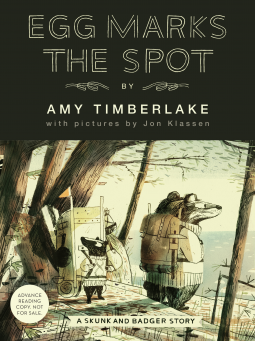 I adored the introduction of Skunk and Badger (Skunk and Badger), at first unwilling housemates, who become fast friends. Badger is a fussy, hyper-organized Important Rock Scientist who resents any interruption of his routine, while Skunk is expansively friendly, speaks to cryptic chickens, and cooks gourmet meals. Skunk’s one obsession is the New Yak Times Book Review. That’s really all a reader needs to know before embarking upon their next adventure: a camping trip. The trip proceeds along hilarious lines, with Badger calculating the exact weight of every multi-purpose article in his neatly organized pack, and Skunk throwing in pots and pans, fresh produce, and other items on which usefulness he and Badger disagree profoundly. This, then, is the essence of their friendship: how the differences supply each other’s blind spots.
I adored the introduction of Skunk and Badger (Skunk and Badger), at first unwilling housemates, who become fast friends. Badger is a fussy, hyper-organized Important Rock Scientist who resents any interruption of his routine, while Skunk is expansively friendly, speaks to cryptic chickens, and cooks gourmet meals. Skunk’s one obsession is the New Yak Times Book Review. That’s really all a reader needs to know before embarking upon their next adventure: a camping trip. The trip proceeds along hilarious lines, with Badger calculating the exact weight of every multi-purpose article in his neatly organized pack, and Skunk throwing in pots and pans, fresh produce, and other items on which usefulness he and Badger disagree profoundly. This, then, is the essence of their friendship: how the differences supply each other’s blind spots. Needless to say, the camping trip quickly takes several unexpected turns with an obnoxious bully from Badger’s past, an incredible find in a cave, the secret mission of chickens, a bivalve moving company, and much, much more. The characters are endearing, the action lively, the prose deliciously inventive, and the deeper themes of friendship, loyalty, and courage shine through.
A splendid book for the whole family to read aloud!

September 10, 2021
Short Book Reviews: Gods and Monsters in a Kansas City Pub

Nectar and Ambrosia (An Amaranthine Inheritance Novel) by E. M. Hamill
Gods and monsters meeting for a drink in a Kansas City pub – how great is that as a premise? Callie stumbles on the place, which apparently only those gifted with rare abilities can see, and into a world of mythology come to life. Soon she’s working as the new server, fending off lustful Pan, matching wits with Puck, managing a lugubriously drunk Zeus, and using her Classics major knowledge to sort everything out. There’s a love interest, the pub owner Florian, sentenced to the confines of the place, and the slow burn attraction has the flavor of romance without dominating the plot.
The book’s strengths are the originality of its premise and plot twists, plus a likeable and capable heroine. For me, these more than overcame its shortcomings and kept me reading. I found it to be at times overwritten, burdened by repetition and belaboring things that I had already figured out. The blend of action-driven plot with romance sensibilities such as long, repeated descriptions of the physical reactions of Callie and Florian to one another, without the centerpiece of their relationship, was at times uneasy. On the whole, however, I found it a quick and enjoyable read.

September 6, 2021
Rosh Hashanah thoughts
September 3, 2021
Short Book Reviews: Physician to the Fae Plague
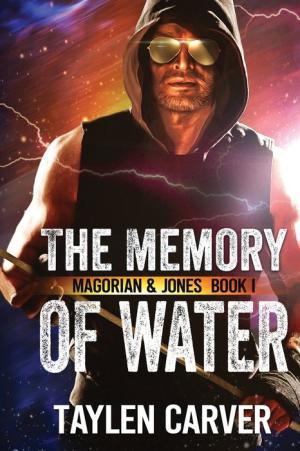 The Memory of Water (Magorian & Jones Book 1), by Taylen Carver (Stories Rule Press, 2020)
The Memory of Water (Magorian & Jones Book 1), by Taylen Carver (Stories Rule Press, 2020) Despite a confusing and completely unnecessary prolog, this book drew me in. A plague has swept the world, killing most of its victims but transforming the survivors into creatures such as goblins, angels, sirens, and dragons. Feared and reviled by the human remnant, these “Errata” are hunted and corralled into reservations. In one such sanctuary, Michael Jones, a physician, devotes himself to treating the plague victims through the all-too-often-fatal metamorphosis. This is despite or perhaps because of the death of his family at the hands of the early Errata. The struggle is often futile, so Jones ends up teaming up with Ben Magorian, an honest-to-goodness wizard, although not the most easy-going person. Despite their incompatible beliefs, Jones’s entrenched skepticism, and Magorian’s antisocial attitudes, the two team up to thwart an even deadlier menace.
Once the story got going, I kept turning the pages. I loved the idea of medical approach to an essentially magical transformation. The various Errata races and their abilities, as well as the individual struggles (or not) to retain their humanity not only fascinated me but raise questions of ethics and compassion. I had a little trouble accepting that most people would so strongly reject their neighbors and family members for getting sick, or would not be curious, eager to have conversations with mythic-appearing creatures or to exploit them in movies, promotions, and the like (human greed at work). That’s my primary criticism, yet I was able to take such rejection and prejudice as a given in this world and go along with the story. I’m a sucker for wounded, conflicted heroes, and Jones was just that. This is the first of a series of the “Magorian and Jones” novels.

August 30, 2021
Deborah Reads from "Eagle's Beak and Wings of Bronze, or Something Unusual Happens to Allis"
Hope you enjoy this snippet:
Release date is September 1. Pre-order it from Amazon; or Barnes & Noble, Kobo, Overdrive, and other vendors.

August 27, 2021
Short Book Reviews: M. A. Carrick's Superb Fantasy Debut
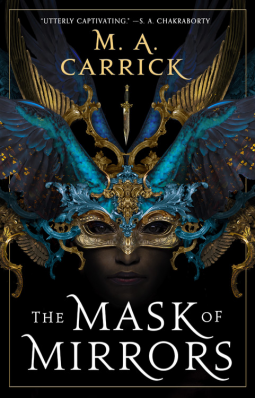 The Mask of Mirrors, by M. A. Carrick (Orbit)
The Mask of Mirrors, by M. A. Carrick (Orbit) Much to my delight as a reader, I find myself in an era of stories that combine history-evoking settings (“big skirts”), fascinating systems of magic, and women who are powerful in deep and unexpected ways. The Women’s War (Jenna Glass) and The Midnight Bargain (C.L. Polk) are two recent examples. The newest addition is a complex tale marked by superb characters and intricate, well-thought-out world-building in a world that resembles Renaissance Venice. My introduction to the book was the guest appearance of the authors, Marie Brennan and Alyc Helms, on Juliette Wade’s program, Dive into World Building, in which they discussed the tarot-like system of divination cards. That would be enough for an ordinary fantasy, but here it’s only a small part of the whole: political history and current power struggles, magical systems and curses, poisons and hallucinogenic drugs, a long con, simmering revenge, and a generation-spanning Robin Hood-like cult figure. Friendships and feuds, masquerades within masquerades, romance in every sense of the word, and most of all, a heroine who is at once conflicted, determined, vulnerable, and resourceful. There are occasional echoes of Dickens’s London, as well as other, familiar worlds, but the whole is fresh and original, a page-turner that left me hungry for more. It's long, and this is a very good thing.

August 20, 2021
Book Review: A Literary Attempt at a YA School Story Mystery
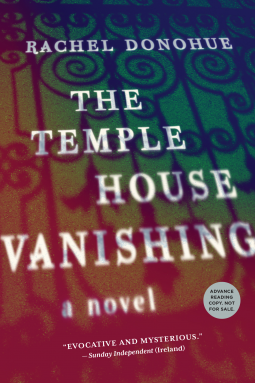
The Temple House Vanishing, by Rachel Donohue (Algonquin Books)
I requested an ARC of this book based on the description: a mystery set in a Catholic boarding school. Twenty-five years before the opening, Louisa, a brilliant but lonely student, and Mr. Lavelle, a charismatic art teacher, have mysteriously disappeared. Victoria, who knew them both, has just committed suicide at the school itself. Why did she kill herself? What happened to Louisa and Mr. Lavelle? Did they elope together? Were they murdered or did they perish through an accident? Or were the disappearances unrelated? The atmosphere of an isolated Victorian mansion set on a cliff in Ireland added to the appeal.
Very early in the book, however, I became increasingly disappointed and frustrated. By the end, I was ready to throw the book across the room in disgust, except that I was reading it on my Kindle and I don’t treat my electronic devices so cavalierly. Based on the description, The Temple House Vanishing promised me a genre novel – YA, school story, and mystery, all in one – and yet it consistently violated the conventions of all three, and not in a skillful way.
The opening point of view, a journalist who happened to live on the same street as Louisa and who is investigating the disappearance, was hard to relate to and never made any sense to me. She isn’t involved in the events, and her own life, irrelevant to the rest of the story, seemed remote and uninteresting. Then we get into Louisa’s story, narrated by herself. Therein lies the second hurdle, because Louisa doesn’t sound or act like a teen, even one who’s stuck in her head. Almost all teens, whether intellectual “brains” or not, center their lives around the fundamental issues of those years: independence from parents, confusion about who they are and what they want to become, desperate need for approval from peers, and so forth. Hormones saturate their bloodstreams, and the parts of their brains associated with executive functions, delayed gratification, and long-term planning, won’t mature until their mid-20s. It doesn’t matter how bright or academically gifted they are, they are still at the mercy of these internal storms. Louisa’s first-person narrative reads like the overly elitist pontifications of a writer with a very poor memory of her own teenaged years, or perhaps one seen through extremely adult-colored lenses, and with no understanding of the conventions of the genre. I cannot imagine a teen reader finding Louisa believable or interesting.
Then we meet Victoria, who becomes the object of Louisa’s bloodless passion. Both girls exhibit a disconnection between their intellectual philosophizing and their relationships so extreme as to verge into psychotic dissociation. I never perceived, through their speech or behavior, or through the inner voice of the narrative, any shred of genuine emotion until very near the end, when it became clear that Louisa was just as infatuated with Victoria as Victoria was with Mr. Lavelle. But for the most part, each experiences a pale, distant imitation of obsession, not the visceral stuff of teen suicide pacts or Romeo and Juliet. Not a hint of lesbian romance, requited or not, could I discern.
Despite these drawbacks, the mystery pulled me along. I skimmed long passages of more-of-the-same-airy-head-stuff, just to find out how it was that Louisa disappeared with Mr. Lavelle and not Victoria, who was convinced he was going to take her away to Europe. To get there, I had to wade through one unpleasant not-a-teenager after another. And to wonder what in the world the adults at the school were thinking to allow vicious rumor, bullying, and inappropriate teacher-student intimacy to continue unremarked. For heaven’s sake, this is a Catholic school; surely they would make a gesture at adult supervision.
Then came the big revelation and the death blow to any vestige of credibility the novel held for me: it turns out that Louisa died at the time of the disappearance, and her remains have never been found. Her voice has been narrating the story all along, but without any hint of her being a ghost. Did the author mean to indicate this by the peculiar and pervasive lack of emotional immediacy? Or did she just not understand that in genre fiction – in any good fiction – you simply cannot set a reader up for one kind of story and then pull a literary rabbit out of the hat with an entirely different one? In no way did the author establish that in this literary world, consciousness persists beyond death. As a reader who was trying hard to understand, and also as a writer of genre fiction myself, I felt betrayed. My time and care had been abused. If the novel weren’t so long, I’d recommend it to my writing students as an example of what not to do.
Fiction works along principles, and those principles are based on the human psyche. Good fiction of any kind engages the reader’s interest and sympathies in specific ways, shaping tension and release. The opening offers an implied contract between author and reader. In essence, the author says, “Place yourself in my hands and this is the kind of experience you will have.” To begin a story with shoot-‘em-up action and end with sappy romance, for example, or to begin with a mystery set in a boarding school and then go, “Surprise! The protagonist is really dead!” is to violate that contract and lose the reader’s trust. I’ve detailed above how the author repeatedly lost my confidence. I don’t think I’ll give her work a second chance.

August 16, 2021
#Darkover Edits!
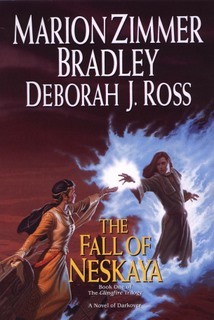
I just received editorial comments and a marked-up manuscript of The Laran Gambit from the editor. It's such a joy to work with a professional who "gets it" and offers intelligent, insightful feedback.Next comes the process of working with the notes to formulate a revision plan. Yes, there is such a thing! Every author approaches revision a bit differently, and in my experience every book requires me to approach it from a slightly different angle. Sometimes the only way to grapple with a structural flaw is to take the whole thing apart, rewrite entire sections, and then put them back together in a different order. Think of it like a Christmas tree, where you're going to keep only half the ornaments but must replace the others as well as the tree itself . That pine tree just won't do—we need a noble fir!
For other books, the basic structure or armature is sound but all the ornaments and branches are out of balance. There may be problems in pacing, for example, or characters that need to be more fully developed.
The first step is to read through the notes not once but several times, deciding firstly what comments are spot-on, which ones miss the mark—revealing how I failed to convince even a careful reader—which ones I have questions about, and so forth. From there, I make a problem list. By this time, it's usually clear how much rewriting (as opposed to tidying up, minor shifting around, tightening, emphasizing, weaving in themes, etc.) I'll have to do. Since it isn't a good use to time to just dive in, willy-nilly, I also create a priority list or diagram, sometimes a flow chart. Novels can be like spiderwebs, where a tug on one thread affects the whole. Rather than have to go through multiple rounds of revision, I develop a sense of the order of changes. That said, I usually do a round of revisions and then a "jeweler's polish" read-through to spot typos and inconsistencies introduced by the changes.
I love to revise and often fine myself immersed in it for long periods of time. This is a good thing because it involves keeping the entire story in mind—all 100,000-150,000 words (which is my typical novel length) of it.
Stay tuned!






